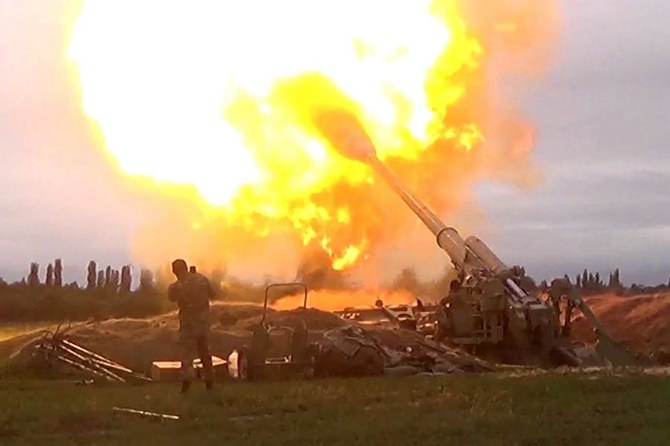BAKU/YEREVAN: Armenia and Azerbaijan accused each other on Monday of violating a new US-brokered cease-fire in fighting over the mountain enclave of Nagorno-Karabakh, casting doubt over the prospects of the latest international push to end a month of clashes.
Azeri President Ilham Aliyev said in a televised address that he wanted to resolve the conflict “by political and military means” and reiterated a demand that ethnic Armenian forces must agree to leave the region for fighting to stop.
Armenian Prime Minister Nikol Pashinyan wrote earlier on his Facebook page that the Armenian side “continued to adhere to the cease-fire.”
The latest fighting in Nagorno-Karabakh, a mountainous part of Azerbaijan populated and controlled by ethnic Armenians, erupted on Sept. 27 and is the worst in the South Caucasus since the 1990s. Hundreds have been killed and two Russian-brokered cease-fires have failed to hold.
World powers want to prevent a wider war that might draw in Turkey, which has voiced strong support for Azerbaijan, and Russia, which has a defense pact with Armenia. The conflict has also strained relations between Ankara and its NATO allies. A third cease-fire since Oct. 10 was agreed to on Sunday after separate talks in Washington between US Secretary of State Mike Pompeo and the foreign ministers of Armenia and Azerbaijan.
Within minutes of its coming into force at 8 a.m. local time (0400 GMT), Azerbaijan’s Defense Ministry said in a statement that Armenian forces had shelled villages in the Terter and Lachin regions, located at opposite ends of the conflict zone.
Authorities in Nagorno-Karabakh denied this: The Defense Ministry said Azeri forces fired missiles on Armenian positions on the northeastern side on the line of contact and the Foreign Ministry said Azeri warplanes had violated the cease-fire.
Armenia’s Defense Ministry said in a statement that the Azeri side violated the truce at around 9:10 a.m. local time.
Pompeo has since left Washington, landing on Monday in India on the first leg of a five-day Asian trip.
Armenians regard Nagorno-Karabakh as part of their historic homeland; Azeris consider it illegally occupied land that must be returned to their control. About 30,000 people were killed in a 1991-94 war over the enclave.
Aliyev, in his address, criticized the OSCE Minsk Group that was formed to mediate the conflict. The group, led by France, Russia and the US, participated in Sunday’s talks and its co-chairs have agreed to meet again with the two foreign ministers in Geneva on Oct. 29.
“For almost 30 years, the Minsk Group co-chairs have tried to reconcile Azerbaijan with the process of freezing the conflict, but we have created a new reality,” Aliyev said. “We are fed up with these negotiations. How long can you negotiate?”



























